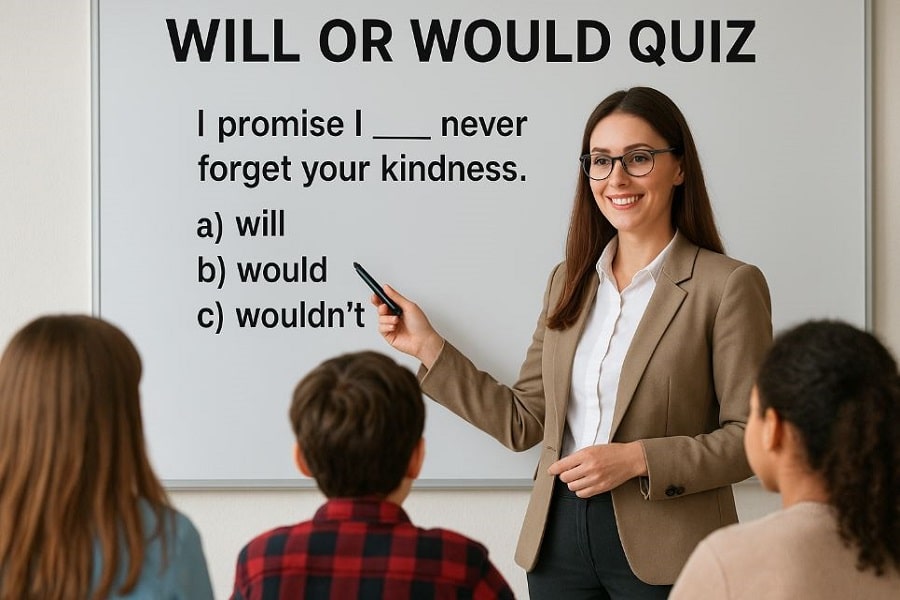In English grammar, “will” and “would” are two commonly used modal verbs, but many learners often confuse them. Both are essential in forming future tenses, conditional sentences, and polite expressions. Understanding when to use will and when to use would can greatly improve fluency and accuracy in both spoken and written English Grammar.
- Will is generally used for definite future actions, promises, predictions, and decisions made at the moment of speaking.
Example: I will call you tomorrow. - Would is often used for polite offers, hypothetical or imaginary situations, and in reported speech.
Example: She said she would help me.
This Will or Would Quiz will help you practice and understand the difference between these two important modal verbs. Let’s test your skills with the following multiple-choice questions.
Will or Would Quiz test
Don’t miss practicing the related quizzes: Would or Can Quiz
Examples and Exercise of the Will or Would Quiz test
1. If it rains tomorrow, we ____ stay at home.
a) will
b) would
c) won’t
2. I promise I ____ never forget your kindness.
a) will
b) would
c) wouldn’t
3. He said he ____ call me when he reached the station.
a) will
b) would
c) won’t
4. Do you think she ____ agree to join us if we invited her?
a) will
b) won’t
c) would
5. I think the meeting ____ start late today.
a) will
b) would
c) wouldn’t
6. If I had more money, I ____ buy a new laptop.
a) will
b) would
c) won’t
7. I’m not sure whether they ____ be ready in time.
a) will
b) would
c) won’t
8. She said she ____ help me with the assignment the next day.
a) will
b) won’t
c) would
9. I hope everything ____ go well during the presentation.
a) will
b) would
c) wouldn’t
10. If you had asked earlier, we ____ have joined you.
a) will
b) would
c) won’t
Answers to the Will or Would Quiz
- a) will
- a) will
- b) would
- c) would
- a) will
- b) would
- a) will
- c) would
- a) will
- b) would
FAQs on Will vs. Would
What is the main difference between will and would?
Will is used for definite future events, while would is used for hypothetical, polite, or conditional situations.
Can would be used in polite requests?
Yes, would is often used for polite offers and requests. Example: Would you like some tea?
Is would it only be used in the past tense?
Not always. While would is the past form of will in reported speech, it is also used to express hypothetical or imaginary situations.
Which is correct: “I will like a coffee” or “I would like a coffee”?
The correct form is I would like a coffee, because it is a polite request.
How can I improve my usage of will and would?
Practice through quizzes, reading examples, and listening to native speakers. Repetition and context are the keys to mastering these modals.
Conclusion
Learning the difference between will and would can be tricky at first, but with practice, you’ll start using them naturally in the right contexts. Remember: will is used for certainty and promises, while would is often used for polite, hypothetical, or past situations.
Keep practicing with quizzes like this one, and you’ll quickly gain confidence in your grammar skills.

